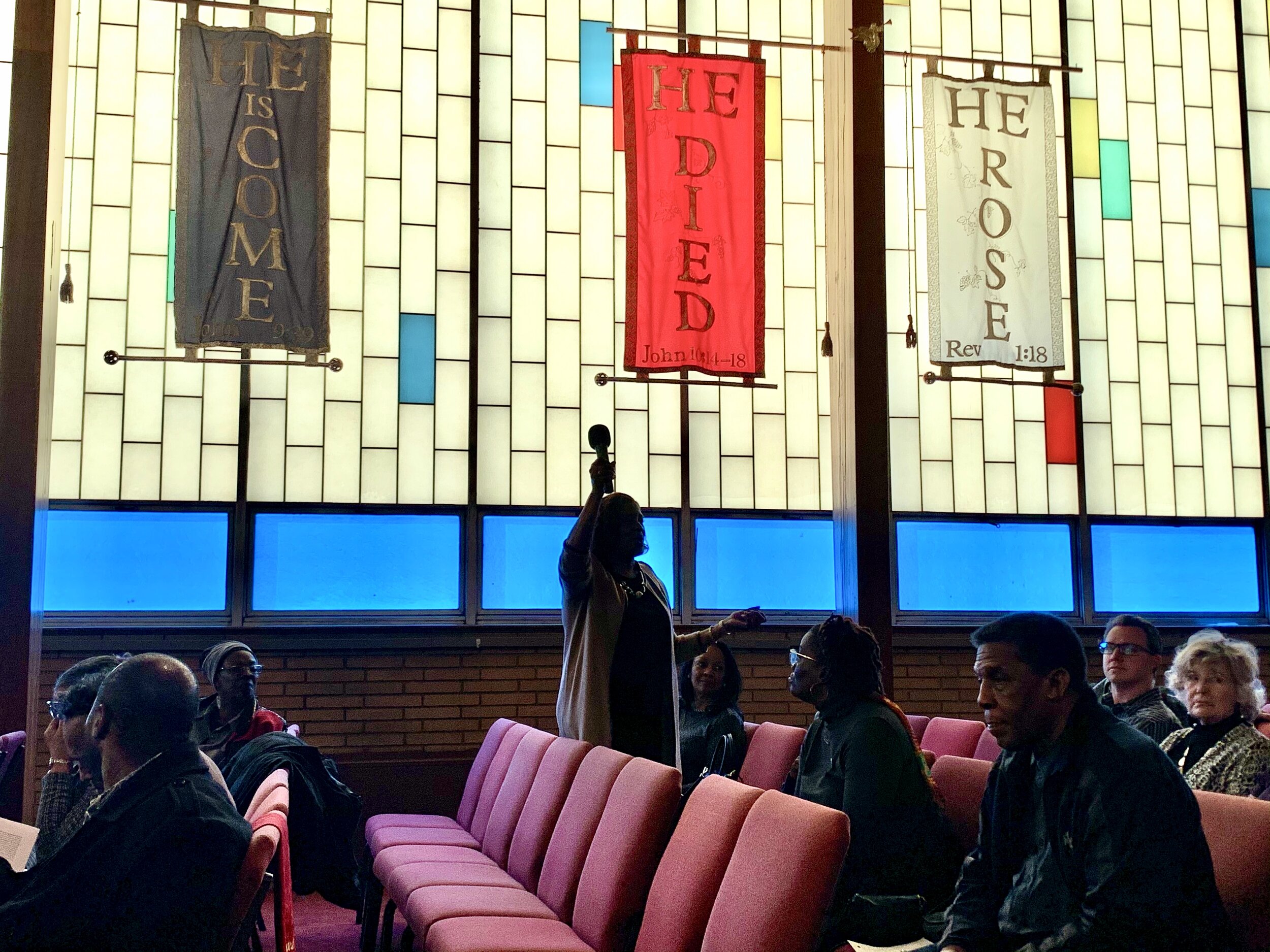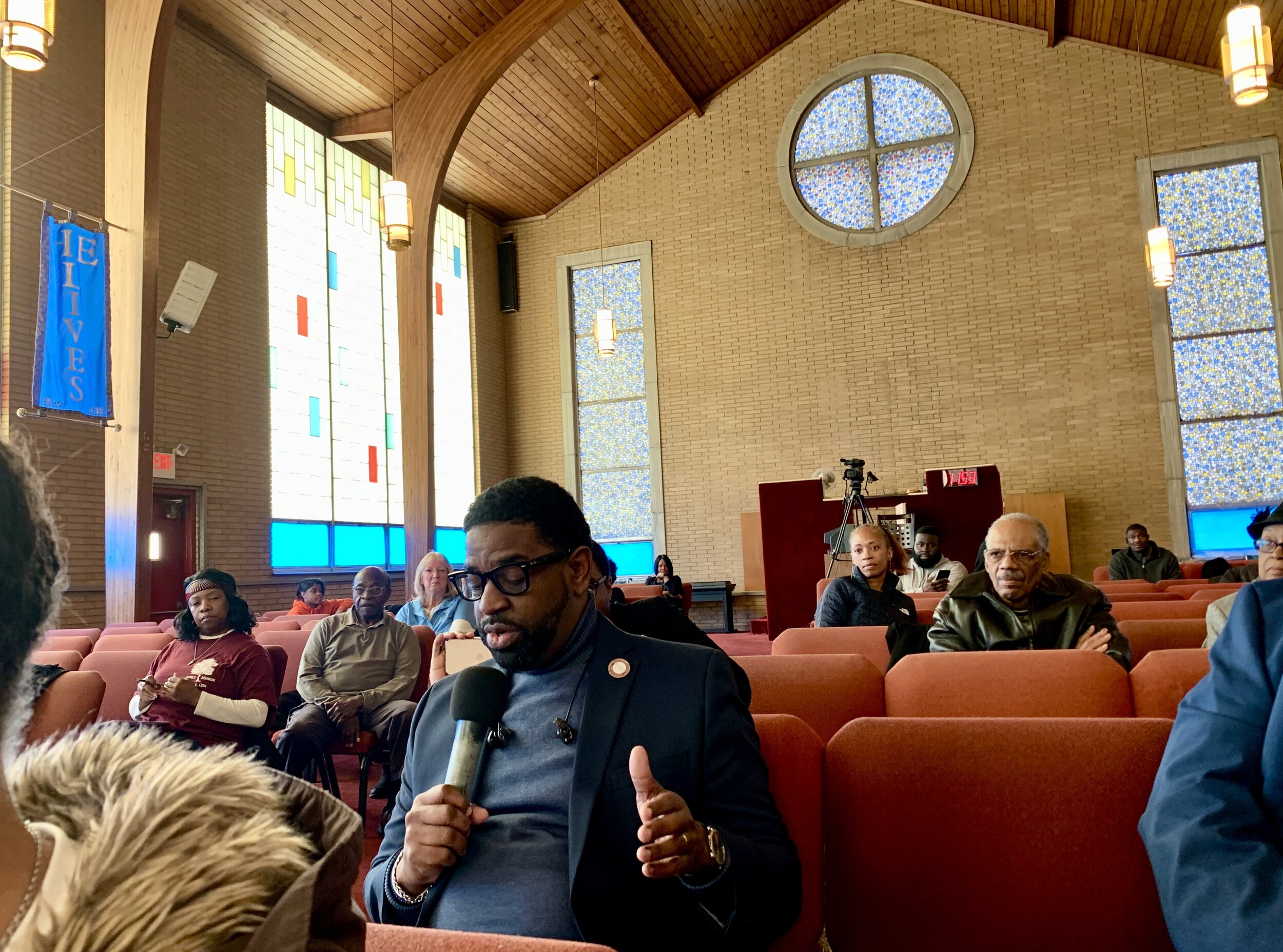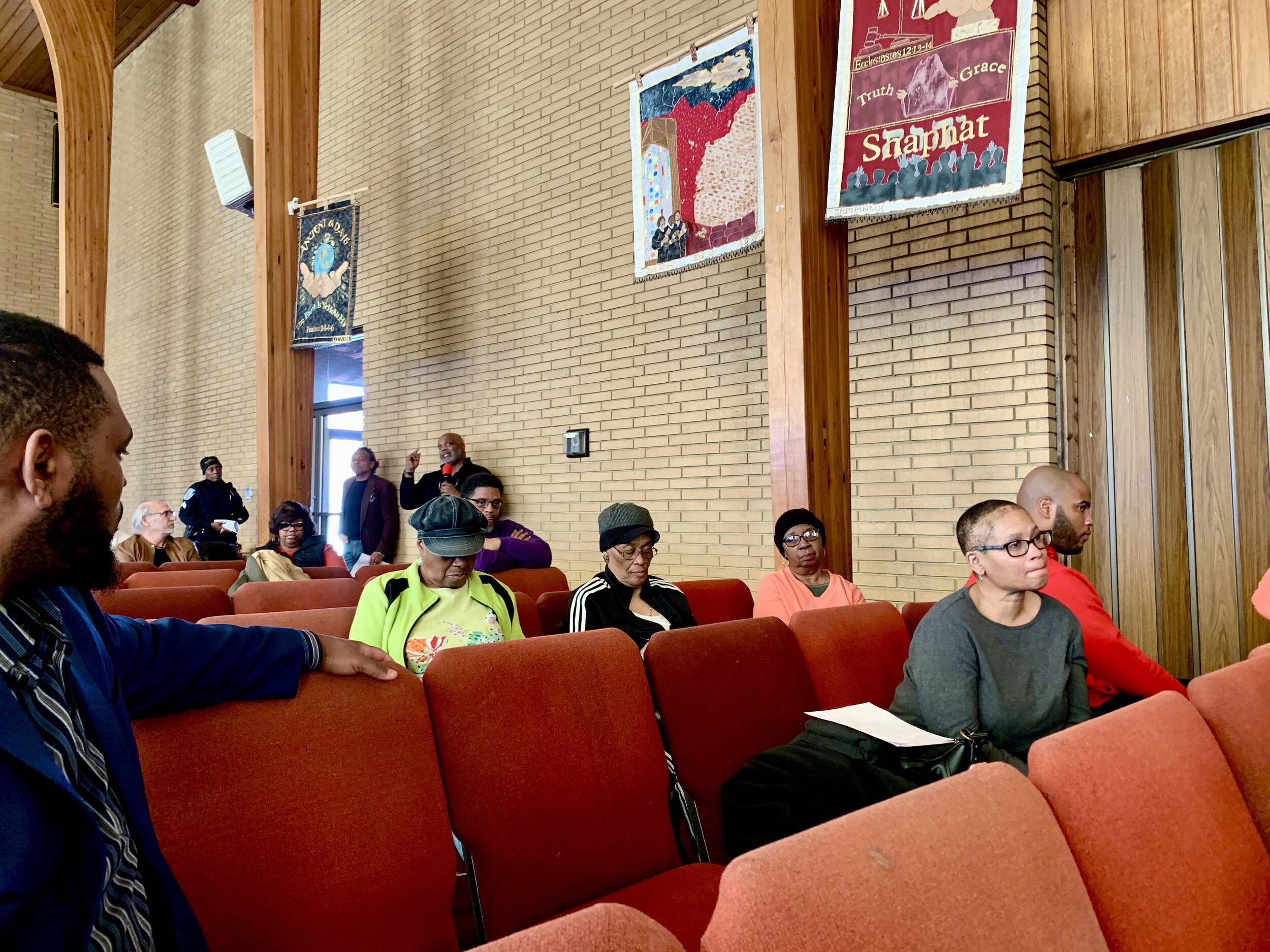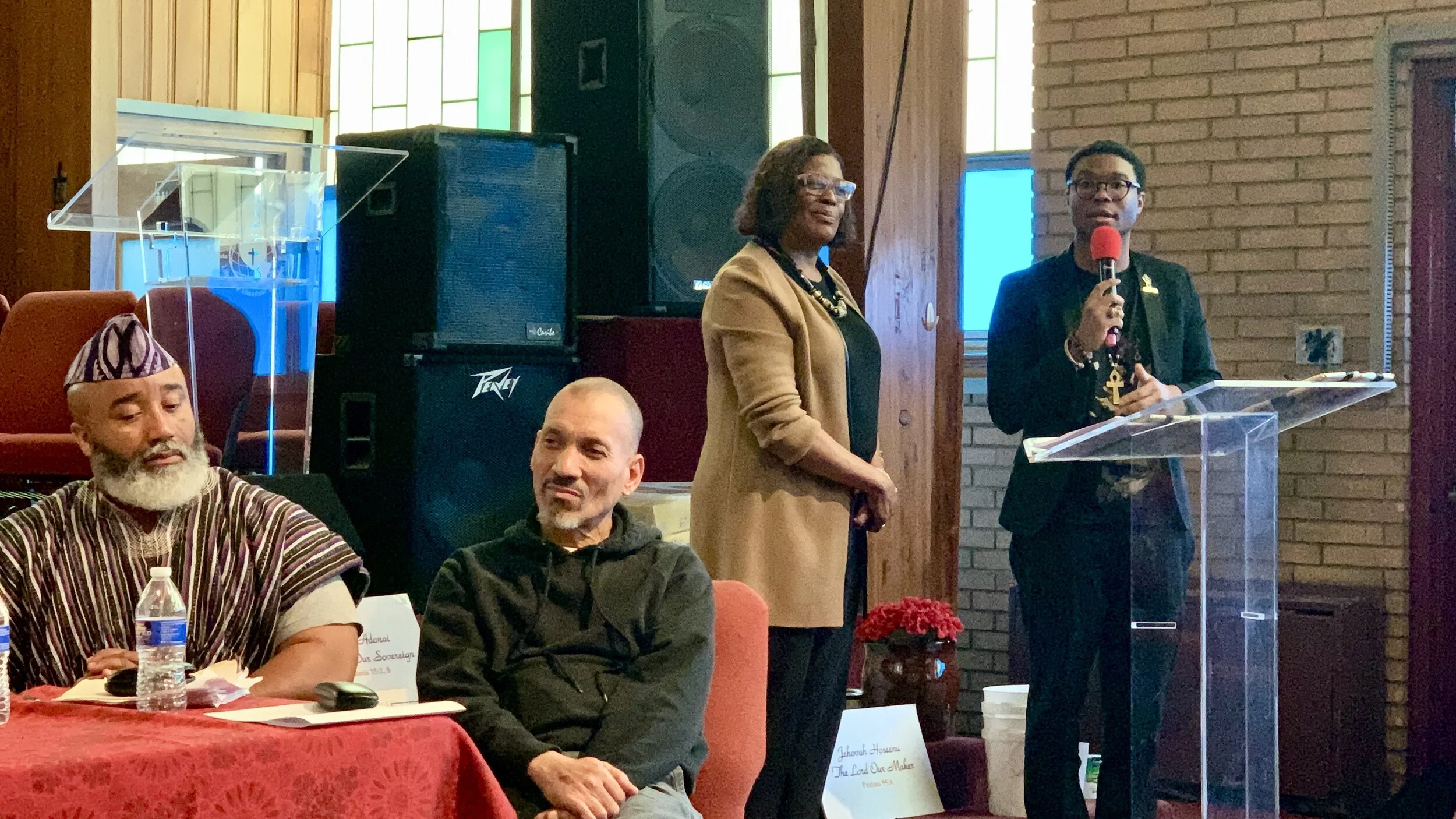Healing & Building: A Community Conversation on Violence & Empowerment
The participants of the Community Conversation on Gun Violence, Community Policing, Economic Empowerment and Education include Sargeant Carol Adam, Rev. Dr. Alison Gise Johnson, Rev. Dr. Patricia A. Gould-Champ, Bishop Darryl F. Husband Sr., Okomfo Olufemi Baraka Shepsu, Pearl Wise-Crawley, Director of Advancement at the Black History Museum & Cultural Center of Virginia), Dr. Ram Bhagat and Allan-Charles Chipman (Faith Rooted Organizer and Transformation Strategist, Initiatives of Change USA).
Images Credit: Sionne Rameah Neely
“How many of you know someone who has been taken by gun violence?” inquired Dr. Ram Bhagat. Nearly all the hands went up in the sanctuary of Church Hill’s Mount Olivet Church. Taking a beat, the panelist looked around the room. “We inherit trauma but that means we also inherit resilience from our ancestors. Both can be passed down to the next generation.” Bhagat, Manager of School Culture and Climate Strategy for Richmond Public Schools and an IofC USA Community Trustbuilding Fellowship alumnus, continued: “We can turn trauma into mechanisms for healing. We can reclaim the original roots - tap into our own spiritual and cultural genius, unapologetically. Heal for and by ourselves.”
The Community Conversation on Saturday, February 29th explored “Gun Violence, Community Policing, Economic Empowerment and Education”. This marks the beginning of the Spiritual Leaders Advisory Council. Comprising nineteen (19) participating churches from Richmond, Chester, Hanover and Henrico counties, the Council was created by The Black History Museum and Cultural Center of Virginia to expand meaningful partnerships “in communities where its members and visitors live.” Initiatives of Change USA is also a partner, working with the Museum (as part of our Intersecting History project) to host and facilitate dialogues focused on critical community issues and to offer pathways towards constructive change.
How do we heal & build?
Rev. Dr. Alison Gise Johnson, the moderator for the conversation opened sharing how “violence becomes a language” reflecting transgenerational and epigenic wounds. Pointing out examples of this, Dr. Johnson, an Associate Professor of Historical and Theological Studies and Associate Pastor of Faith Community Church, connected a series of displacements between indigenous persons and communities of African ancestry within Virginia and the U.S. She detailed the goal of the Community Conversation as “Sankofa” - an effort to engage history and move the needle forward with panelists who are “innovative forerunners bringing peace about within a nation that really doesn’t know peace”.
Okomfo Olufemi Baraka Shepsu, a social worker serving Richmond Public Schools, expressed how his work emerges from an “unconditional love for Black people dedicated to life, sovereignty, liberation and freedom.” There is a historical imprint of “intergenerational trauma” that links “the Great Migration to forced migrations now”. Shepsu pulled out a few woven threads of this trauma-inherited pattern, one by one: “The original problem began on the James River when we arrived enslaved. The crack cocaine epidemic [in the 1980s] really disrupted Black family life in the U.S. making Richmond at one time the murder capital of the country. Mass incarceration, foster care, the group home industry. The drop-out rate skyrocketed, and gangsterism/thug life culture took over hip hop.”
Bishop Darryl F. Husband Sr., the Senior Pastor of Mount Olivet Church and founder of Life More Abundant Ministries, joined in speaking on the toil trauma regenerates within people over time: “How many generations does it take to heal a broken people? Telling our stories is so important. We need to also expand our history beyond our beginning in the U.S. as enslaved persons. Let’s reform education and expand Black History month outside of February and to every city. county, and town in this country. I work in reconciliation because of the hate placed on my grandparents. Salvation for us has always been about people, community, it’s not just personal.”
Rev. Dr. Patricia A. Gould-Champ, Professor of Historical and Theological Studies and Pastor of Faith Community Church, concurred. She stated that the Black church has moved away from the original foundation. “The Black church is still essential for the community and all we do. We were once taught that there is no genuine deliverance for one single person until all people are delivered. Our theology makes room for all persons whether of different faiths or non-faith. We must and can live together because we bring the essence of community and survival.”
Following these assertions, questions from the audience surfaced emanating concern, love, exasperation and hope. These queries centered on tangible ways to bridge differences within Black communities – across age, economic status, education level, neighborhood and faith – and how to create relationships bound by recognition, empathy and trust.




Through the “trauma and silent suffering” of losing her mother to domestic violence at a young age, Sargeant Carol Adams was called to become part of the police force because “the justice system is my purpose and a place to “share my pain and my story so my mother is not forgotten”. When asked how older generations can enable healthy communication with young people, Sgt. Adams, also founder of the Carol Adams Foundation, dialed in: “They don’t trust because the community has not been trustworthy. Do we see how they got to where they are? We have unrealistic expectations and we are looking at it from our vantage point. Provide a listening ear, understand and respect, see them as human beings.”
Dr. Bhagat followed by discussing The Wounded Warriors mural at Martin Luther King Jr. Middle School, a current project with visual artist Hamilton Glass that allows young people to learn new creative skills. Wounded Warriors also provides students a tangible strategy to grapple with emotional stress while curbing disciplinary actions (such as suspensions) and disrupting the school to prison pipeline.
Through his work as founder of Drums No Guns Foundation, Bhagat drove home the importance of “humanizing people who have been personally affected by gun violence.” He closed by stating, “We can build bonds with young people. We do this by creating safe space to connect and express our inherent power of rhythm.”





